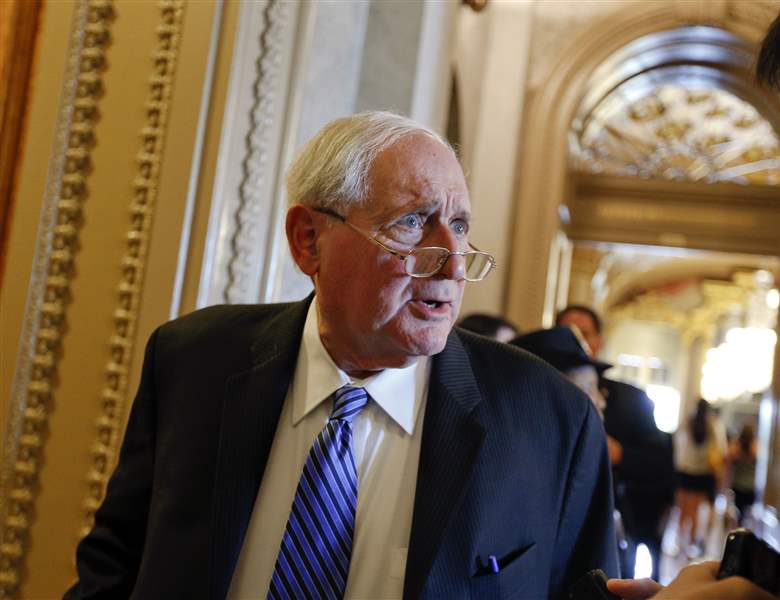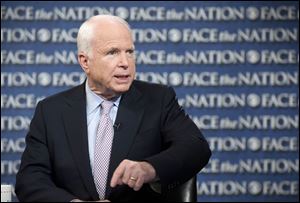
Obama seeks Syria support from former foe McCain
9/2/2013
File -In this July 30, 2013, file photo, U.S. Senate Armed Services Committee Chairman Carl Levin, D-Mich., speaks with a reporter outside the Senate chamber at the Capitol in Washington. Levin says he supports President Barack Obama’s statement Saturday, Aug. 31, 2013, that he would seek congressional action before responding militarily to the apparent use of poison gas against Syrian civilians. (AP Photo/Scott Applewhite, File)
ASSOCIATED PRESS

Sen. John McCain, R-Ariz., talks about the U.S. response to Syria on CBS's "Face the Nation" in Washington Sunday.
WASHINGTON — President Obama, seeking a congressional endorsement for U.S. military intervention in civil war-wracked Syria, is inviting two leading Capitol Hill foreign policy hawks to the White House in efforts to sell the idea to a nation deeply scarred by more than a decade of war.
Having announced over the weekend that he’ll seek congressional approval for military strikes against the Assad regime, the Obama administration is now trying to rally support among Americans and persuade members of Congress with an array of views on Syria.
Sen. John McCain, Obama’s White House opponent in 2008, will be joined for the talks later today by Sen. Lindsey Graham of South Carolina, who like McCain has argued that Obama must not only punish the Syrian regime with surgical missile strikes but must seek to change the course of the civil war and oust President Bashar Assad from power.
Obama has said he wants limited military action to respond to an attack in the Damascus suburbs last month that the U.S. says included sarin gas and killed at least 1,429 civilians, more than 400 of whom were children.
McCain and Graham, both Republicans, represent the most aggressive faction in Congress and have called on Obama to launch more comprehensive strikes with an aim of destroying President Bashar Assad’s air power, his military command and control, Syria’s ballistic missiles, and other military targets while at the same time increasing training and arming of opposition forces.
On the other side of the spectrum, some Republican and Democratic lawmakers don’t want to see military action at all.
Members of the House Democratic caucus were to participate in an unclassified conference call today with Obama national security adviser Susan Rice, Secretary of State John Kerry, Defense Secretary Chuck Hagel, Director of National Intelligence James Clapper and Gen. Martin Dempsey, chairman of the Joint Chiefs of Staff.
The White House is engaging in what officials call a “flood the zone” persuasion strategy with Congress, arguing that failure to act against Assad would weaken any deterrence against the use of chemical weapons and could embolden not only Assad but also Iran and the Lebanese militant group Hezbollah.
Obama’s turnabout decision to seek congressional authority on Syria sets the stage for the biggest foreign policy vote in Congress since the Iraq war.
On Sunday, Kerry said the U.S. received new physical evidence in the form of blood and hair samples that shows sarin gas was used in the Aug. 21 attack. Kerry said the U.S. must respond with its credibility on the line.
“We know that the regime ordered this attack,” he said. “We know they prepared for it. We know where the rockets came from. We know where they landed. We know the damage that was done afterwards.”
On Capitol Hill Sunday, senior administration officials briefed lawmakers in private to explain why the U.S. was compelled to act against Assad. Obama, Vice President Joe Biden and White House Chief of Staff Denis McDonough also made calls to individual lawmakers.
In addition to today's meetings and briefings, further sessions were planned for Tuesday and Wednesday. The Senate Foreign Relations Committee plans a meeting Tuesday, according to its chairman, Sen. Bob Menendez, D-N.J. The Senate Armed Service Committee will gather a day later, said Oklahoma Sen. Jim Inhofe, the top Republican on the panel.
“The American people deserve to hear more from the administration about why military action in Syria is necessary, what it will achieve and how it will be sufficiently limited to keep the U.S. from being drawn further into the Syrian conflict,” said Sen. Bob Corker of Tennessee, the top Republican on the Foreign Relations Committee, reflecting a more cautious approach to a military strike.
McCain said Obama asked him to come to the White House specifically to discuss Syria.
“It can’t just be, in my view, pinprick cruise missiles,” the Arizona Republican told CBS’ “Face the Nation.”
In an interview with an Israeli television network, he said Obama has “encouraged our enemies” by effectively punting his decision to Congress. He and Graham have threatened to vote against Obama’s authorization if the military plan doesn’t seek to shift the momentum of the 2 ½ year civil war toward the rebels trying to oust Assad from power.
Obama is trying to convince Americans and the world about the need for action.
So far, he is finding few international partners willing to engage in a conflict that has claimed more than 100,000 lives in the past 2½ years and dragged in terrorist groups on both sides of the battlefield.
Only France is firmly on board among the major military powers. Britain’s Parliament rejected the use of force in a vote last week.
Russia’s foreign minister, Sergey Lavrov, said today the information the U.S. showed Moscow to prove the Syrian regime was behind the chemical attack was “absolutely unconvincing.”
With Navy ships on standby in the eastern Mediterranean ready to launch missiles, Congress on Sunday began a series of meetings that are expected to continue over the next several days in preparation for a vote once lawmakers return from summer break, which is scheduled to end Sept. 9.
Senior administration officials gave a two-hour classified briefing to dozens of members of Congress in the Capitol on Sunday.
Lawmakers expressed a range of opinions coming out of the meeting, from outright opposition to strident support for Obama’s request for the authorization to use force.
Among Democrats, Rep. Sander Levin of Michigan said he’d approve Obama’s request and predicted it would pass. Rep. Elijah Cummings of Maryland said he was concerned the authorization might be “too broad.” Rep. Bennie G. Thompson, the senior Democrat on the House Homeland Security Committee, said the administration still has “work to do with respect to shoring up the facts of what happened.”
Republican Rep. Cathy McMorris Rodgers of Washington said she was concerned about what Congress was being asked to approve. Sen. Jeff Sessions, R-Ala., said the war resolution needed tightening.
“I don’t think Congress is going to accept it as it is,” Sessions said.